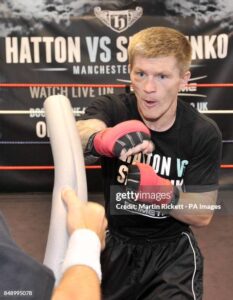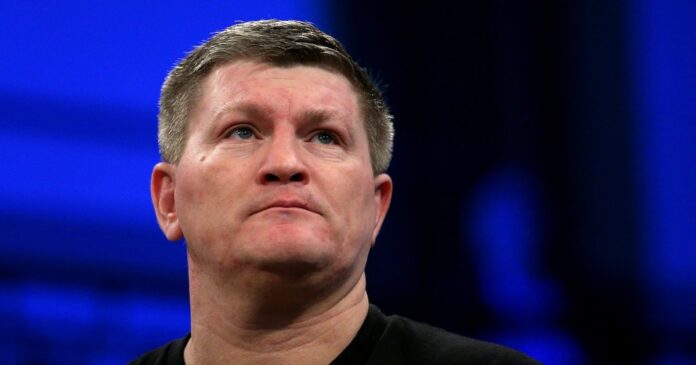Shadows of the Ring: Ricky Hatton’s Final Walk into the Night

As the clock ticked toward midnight on September 13, 2025, in the quiet suburbs of Hyde, Greater Manchester, Ricky Hatton—the “Hitman” whose name once echoed through packed arenas like a war drum—stepped out into the cool autumn air. Sources close to the family, speaking on condition of anonymity to The Manchester Echo, reveal a chilling detail from his final hours: Hatton, dressed in a simple tracksuit and trainers, carried only a single pair of worn boxing gloves tucked under his arm. No phone, no wallet, just the leather symbols of his past glory, as if the weight of two decades in the ring compelled him one last time to wander the streets where his legend began. It was a solitary stroll through the misty lanes of Gee Cross, ending back at his Bowlacre Road home, where he would be found lifeless the next morning at 6:45 a.m. by concerned friends who noticed his absence from a scheduled gym session. Greater Manchester Police have ruled the death non-suspicious, but this haunting image of the 46-year-old clutching his gloves has ignited a firestorm of speculation and sorrow, fans dubbing it “the loneliest ring walk of all.”
The revelation, first whispered in local pubs and then amplified across social media, paints a portrait of a man inextricably bound to the sport that both built and broke him. Hatton, born in Stockport in 1978 and raised on the Hattersley council estate, wasn’t just a boxer; he was Manchester’s beating heart, a pint-swigging everyman who turned professional at 18 and stormed to 43 straight wins before the world took notice. Those gloves, sources say, were relics from his 2005 masterpiece against Kostya Tszyu—the night 20,000 fans turned the MEN Arena into a blue-and-white frenzy, chanting “There’s only one Ricky Hatton” as he forced the unbeaten legend to quit on his stool. “He’d stare at them sometimes, lost in thought,” one longtime trainer confided. “Like they held all the answers to what came after the belts.” That late-night walk, under sodium streetlights flickering like ring spotlights, feels like a final, unspoken tribute to the kid from the estates who conquered Las Vegas but couldn’t outrun his inner demons.

Eyewitness accounts, pieced together from neighbors roused by the soft crunch of gravel, describe Hatton pausing at familiar spots: the corner shop where he’d buy his post-fight takeaways, the park bench where he’d nursed hangovers after wild celebrations. “He looked peaceful, almost smiling, hugging those gloves like old mates,” said one resident, who wished to remain unnamed out of respect. No words exchanged, no calls for company—just the Hitman and his shadows. By 1 a.m., he slipped back inside, the door clicking shut like a bell signaling the end of a round. Hours later, the North West Ambulance Service responded to a welfare check, confirming the body of the 46-year-old at his modest semi-detached home. Flowers, Manchester City scarves, and—poignantly—pairs of boxing gloves soon piled at the gate, mourners braving the rain to leave tributes that mirrored the lone item he’d carried into the night.
This detail emerges amid a torrent of tributes that underscore Hatton’s unbreakable bond with the public. On X, the platform once known as Twitter, the story spread like wildfire. “Ricky’s last walk with just his gloves? That’s not haunting, that’s poetry— the fighter who gave everything, taking nothing but his soul with him,” posted @HydePrideBoxing, a thread amassing over 10,000 likes in hours. Another user, @MancLadFights, shared a grainy photo of scuffed Everlast gloves: “If true, it’s the Hitman signing off on his terms. No surrender. 💔 #RIPRicky.” The speculation ties into Hatton’s recent buzz: just weeks prior, he’d announced a comeback bout in Dubai for December, posting gym clips that showed flashes of his old fire. “One more dance,” he captioned a video of him pounding the heavy bag, gloves laced tight. But friends now admit the hype masked deeper fractures. “He was training hard, but those nights alone… the gloves were his only constant,” a source revealed.
Hatton’s life was a brutal symphony of highs and lows, each punch thrown echoing the next. From his pro debut in Widnes in 1997—a first-round KO that hinted at the storm to come—to unifying the light-welterweight titles against Carlos Maussa in 2005, he was relentless. His style? Pressure cooker warfare: bobbing under hooks, unleashing liver shots that folded foes like cheap suits. Fans adored the “Ricky Fatton” jokes, the way he’d balloon post-fight, downing kebabs with the masses. “He was us,” as Wayne Rooney put it in a tearful Instagram post, recalling carrying Hatton’s belts into the ring. “A lad who made it, but never left us behind.”
Yet glory’s aftertaste was bitter. The 2007 superfight with Floyd Mayweather Jr. in Vegas drew 16,000 British invaders, who sang through a 10th-round TKO loss that shattered Hatton. “I hit rock bottom,” he confessed in the 2023 documentary Hatton, detailing the cocaine spiral, depression, and suicidal thoughts that followed. “Every day felt like round 13.” His 2009 KO by Manny Pacquiao left him unconscious for minutes, a scar that lingered. Retirement in 2012 brought no peace; a 2012 comeback loss to Vyacheslav Senchenko only deepened the void. Hatton turned advocate, founding the Hatton Academy for troubled youth and speaking openly on mental health. “Boxing saved me, but it nearly killed me too,” he told BBC Radio Manchester in 2022. His family echoed this in a statement days after his death: “Ricky was in a good place, surrounded by love. His legacy endures.”
The boxing world reeled. Tyson Fury, the Gypsy King who’d idolized Hatton, posted: “There will only ever be one Ricky Hatton. Rest easy, brother.” Amir Khan, a Mancunian rival turned friend, wrote: “A warrior in the ring, a mentor out of it.” Liam Gallagher, who walked Hatton out against Paulie Malignaggi in 2008, simply shared Oasis’ “Don’t Look Back in Anger” with a blue heart emoji. Even across the pond, ESPN’s tributes highlighted his “all-action style that made him a 2000s icon.” At Manchester City’s Etihad Stadium derby on September 14, rivals united for a minute’s applause, Pep Guardiola wiping tears as “Blue Moon”—Hatton’s walkout tune—rang out.
On talkSPORT’s Fight Night, hosts Gareth Davies and Spencer Oliver dissected the Tszyu triumph: “The best night of boxing I’ve ever seen,” Davies choked out, replaying the 11th-round stoppage. Frank Warren, his early promoter, remembered the “insane weight cuts and legendary foes” that defined him. But beneath the nostalgia lurked a darker thread. A Daily Mail investigation into Hatton’s final days exposed boxing’s “open secret”: the post-career plague of addiction and isolation plaguing fighters like Fury and Frank Bruno. “Loneliness, drink, drugs—the ring takes more than it gives,” the piece lamented, quoting Hatton’s own words from a 2013 interview: “I didn’t know what I was doing from one day to the next.”
Dan Walker, the broadcaster who’d interviewed Hatton post-fight, captured the man’s essence on X: “Every day is a fight… even if I get knocked down, I finish with my hand in the air.” That resilience defined Hatton—the 45-3 record (32 KOs), the International Boxing Hall of Fame induction in 2024, the father to four who reconciled with his parents despite rocky patches. Yet the gloves on that final walk symbolize the unfinished business. “He was planning that Dubai fight to prove something—to himself, to us,” a close associate told Sky Sports. “Those gloves? They were his ticket back.”
As September 26 dawns twelve days after the tragedy, Manchester mourns with murals in Hyde gyms and vigils at Sale West ABC, where a teenage Hatton first laced up. Queensberry Promotions shared a clip of his Maussa unification: “The Pride of Hyde forever.” Donald McRae in The Guardian evoked sparring sessions: “He was utterly lost in boxing. Pure.” The World Boxing Association affirmed: “His indomitable spirit lives on in every fight.”
Hatton’s story isn’t one of defeat; it’s a reminder that warriors carry their battles beyond the ropes. That late-night walk, gloves in hand, wasn’t surrender—it was a quiet defiance, a final shadowbox against the dark. In the words of fans chanting in digital threads, “There’s only one Ricky Hatton.” And as the city lights dim on another Hyde evening, they’ll swear they see him still, strolling home with glory under his arm.



